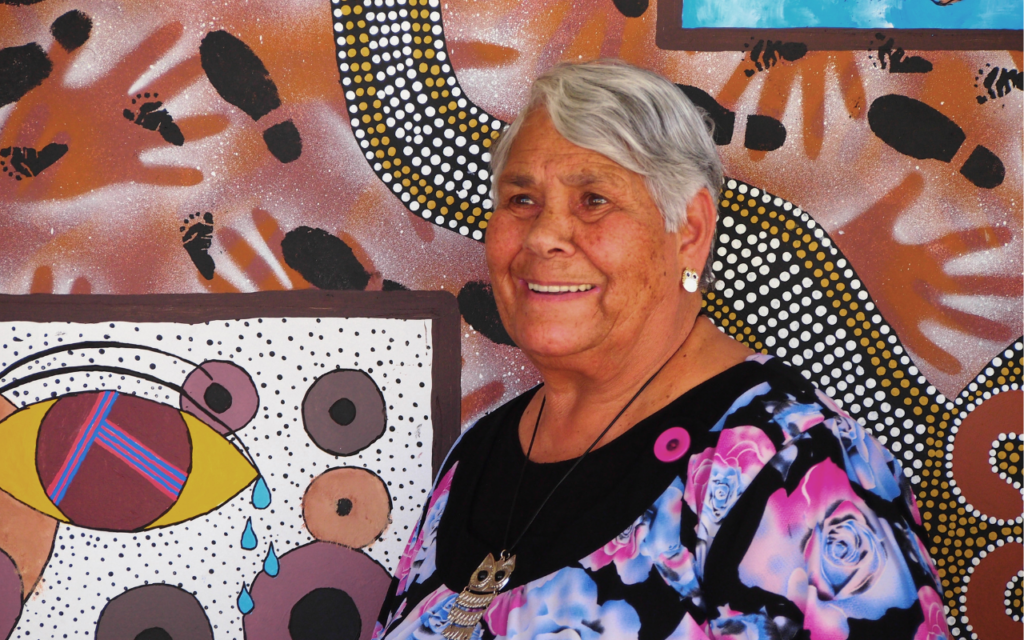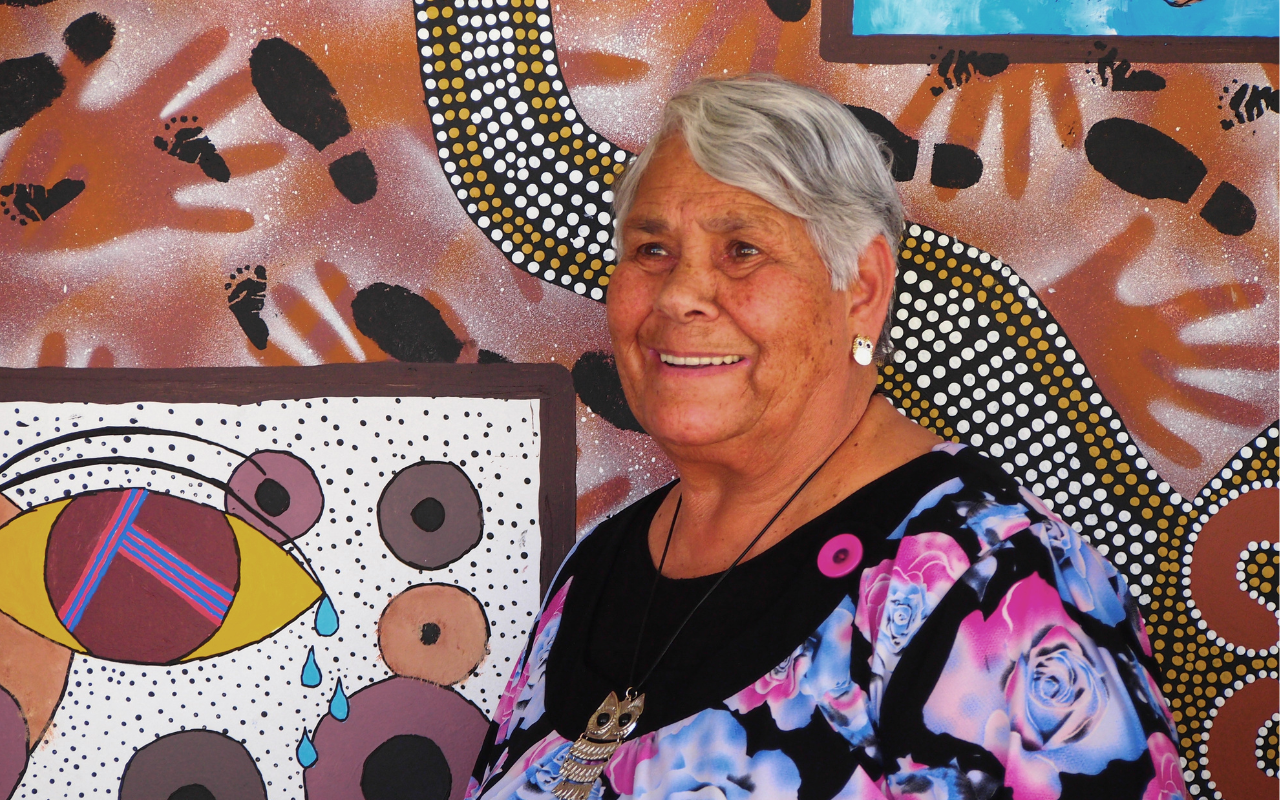The Medical Journal of Australia pays its respects to Dr Lowitja O’Donoghue, a leading Indigenous health advocate.
Aboriginal and Torres Strait Islander readers are advised this article contains the name and images of a deceased person.
Dr Lowitja O’Donoghue AC CBE DSG
1 August 1932 – 4 February 2024
Dr Lowitja O’Donoghue AC CBE DSG, a Yankunytjatjara woman, senior nurse and leading Indigenous advocate, died peacefully with family by her side on Sunday 4 February, aged 91.
A respected leader and social justice activist, Dr O’Donoghue dedicated her life to the wellbeing of Aboriginal and Torres Strait Islander peoples and has been described as the greatest Aboriginal leader of the modern era.
Dr O’Donoghue was born in 1932 at De Rose Hill, in the remote north-west corner of South Australia. She began her medical career as a trainee nurse at the Royal Adelaide Hospital in 1954, the first Aboriginal person to do so. Advancing to the position of Charge Sister, Dr O’Donoghue stayed at the hospital for ten years before moving into positions of social leadership.
Dr O’Donoghue campaigned during the 1967 Referendum, and afterward joined the South Australian branch of the federal Office of Aboriginal Affairs. In 1970, she became a member of the Aboriginal Legal Rights Movement.

In 1975, Dr O’Donoghue was the first woman to be a regional director of an Australian federal department. As Regional Director of the South Australian Department of Aboriginal Affairs, she was responsible for the local implementation of national Aboriginal and Torres Strait Islander welfare policy.
In 1977, Dr O’Donoghue was appointed the inaugural Chairperson of the National Aboriginal Conference (one of the first groups to call for an Aboriginal and Torres Strait Islander Voice). She was named Australian of the Year in 1984, and in 1992 was the first Aboriginal person to address the United Nations General Assembly. Dr O’Donoghue was the inaugural chair of the Aboriginal and Torres Strait Islander Commission (ATSIC) from 1990 to 1996.
Indigenous leader Mr Noel Pearson praised her as the greatest Aboriginal leader of the modern decade.
“Without Lowitja’s ATSIC we would never have defended Eddie Mabo’s great legacy and negotiated the Native Title Act and Indigenous Land Fund,” Mr Pearson said.
Lowitja Institute CEO Adjunct Professor Janine Mohamed said Dr O’Donoghue had been an inspiration to Aboriginal and Torres Strait Islander people throughout her life, defying the barriers placed before her, first as a nurse and then in state, national and international affairs.
“Dr O’Donoghue broke new ground continuously, she brought strength, intelligence and tenacity to critical policy issues over decades, from land rights through to health equity,” Dr Mohamed said.
“The Lowitja Institute has been honoured to benefit from her name, leadership and guidance over the past 14 years.”
Adjunct Professor Mohamed expressed the deep sympathies of Lowitja Institute’s Board, management and staff to Dr O’Donoghue’s family.
“Her love for her family and community is a legacy that will live on,” she said.
After the High Court’s 1992 Mabo decision, it was Dr O’Donoghue who proactively gathered Aboriginal and Torres Strait Islander leaders to negotiate and design native title legislation with Prime Minister Paul Keating’s Cabinet. It was the first time Aboriginal people had been invited into Cabinet, and resulted in Aboriginal and Torres Strait Islander peoples having title to approximately 46% of the Australian land mass.
“The consultation … gave effect to an Aboriginal Voice speaking and representing a national community in designing a law to recover their expropriated traditional lands. A voice Lowitja put together out of insight and courage,” said Prime Minister Keating of Dr O’Donoghue’s leadership.
When Paul Keating subsequently offered Dr O’Donoghue the position of Governor General, she refused and said, “I’m a republican. And so are you.”
Dr O’Donoghue has received numerous awards, honorary doctorates, and accolades in her decades as a health professional. She was named Australian of the Year, was made an Australian National Living Treasure, received a Papal honour from Pope John Paul II and investiture as a Dame of the Order of St Gregory the Great; she received the NAIDOC Lifetime Achievement Award, was made a Commander of the Order of the British Empire and then a Companion of the Order of Australia (the first Aboriginal woman to be honoured with the award), and has honorary doctorates from universities around Australia.
The story of Dr O’Donoghue’s overwhelming effectiveness as a human rights advocate is testament to her immense talent and leadership. She also overcame significant racism and discrimination in both her professional and personal life to create that strong legacy.
Dr O’Donoghue was a member of the Stolen Generations. Taken from her parents at two years of age to live at Colebrook Children’s Home at Quorn, South Australia, she endured emotional and physical abuse, and wasn’t allowed to speak her own language or ask questions about her origins or parents. It was an injustice she defied.
“I became quite rebellious because I was always asking the questions: Who am I? Where did I come from?” said Dr O’Donoghue.
When officials tried to prevent Dr O’Donoghue from entering nursing training at the Royal Adelaide Hospital, she wrote to the state Premier, among others, before being admitted.
“I’d resolved that one of the fights was to actually open the door for Aboriginal women to take up the nursing profession, and also for those young men to get into apprenticeships,” Dr O’Donoghue said.
In 1962, Dr O’Donoghue travelled to India as a nurse, a trip that highlighted for her the human rights struggle on a global scale. It was upon being reunited with her mother after 30 years apart, however, that Dr O’Donoghue devoted her life to the wellbeing of Aboriginal and Torres Strait Islander peoples, a decision that brought “new meaning and a whole new dimension” to her life.
Dr O’Donoghue was patron to numerous foundations and health organisations. The Lowitja Institute, established in 2010 in her name, is Australia’s only national Aboriginal and Torres Strait Islander community-controlled health research institute. The Lowitja O’Donoghue Foundation was established in 2022 to mark Dr O’Donoghue’s 90th birthday.
The Medical Journal of Australia pays tribute to the life of Dr O’Donoghue, a bright light for the health and wellbeing of Aboriginal and Torres Strait Islander people and in the life of our nation. We send our condolences to her family and friends.
In lieu of flowers, Dr O’Donoghue’s family asks people and organisations to please consider a donation to the Lowitja O’Donoghue Foundation in memory of Dr O’Donoghue.
Subscribe to the free InSight+ weekly newsletter here. It is available to all readers, not just registered medical practitioners.

 more_vert
more_vert
🖤💛❤️🙏🪃👣👏👍👏👍.
RIP Elder-
Dr Lowitja Odonoghue🙏🌻.
The legacy and teaching as a Matriarchal of Knowledge Holder, of Aboriginal history, cultural heritage and peoples in Australia is grounded in Boodja. I pay #Respect 🙏👣🖤💛❤️👣🪃🌻. Your spirit is at peace in the ‘Dreamtime ‘.
Thank you for your compassion, support and strength ✊️🙏✊️🙏✌️❤️🔥.
Boordawan, 🖤💛❤️👣🪃.
Vale Dr O’Donoghue – a trailblazer who dedicated her life to the benefit of others.